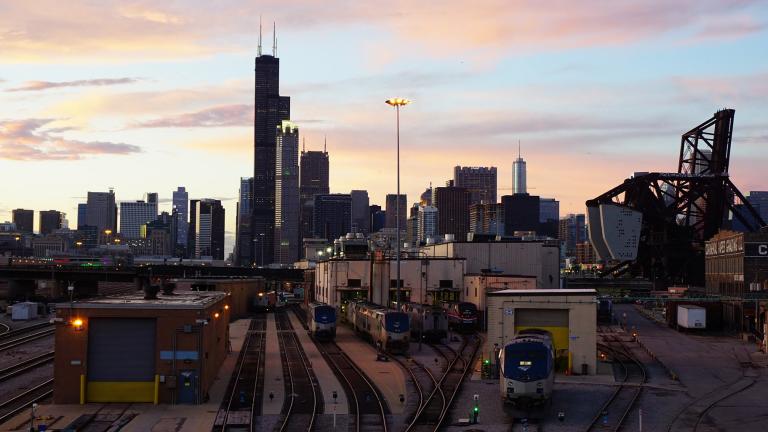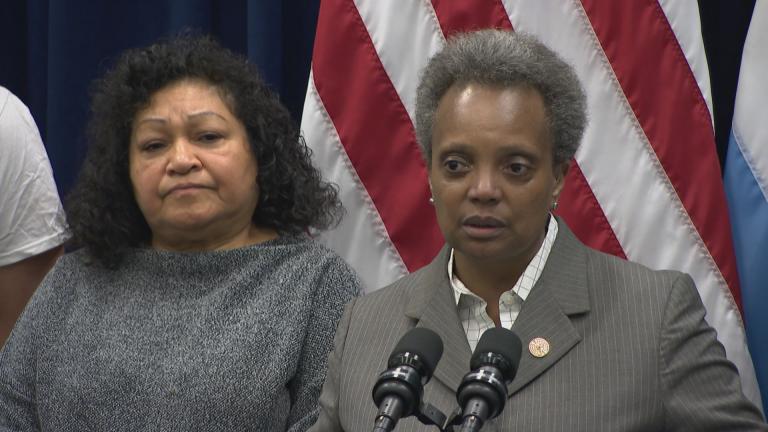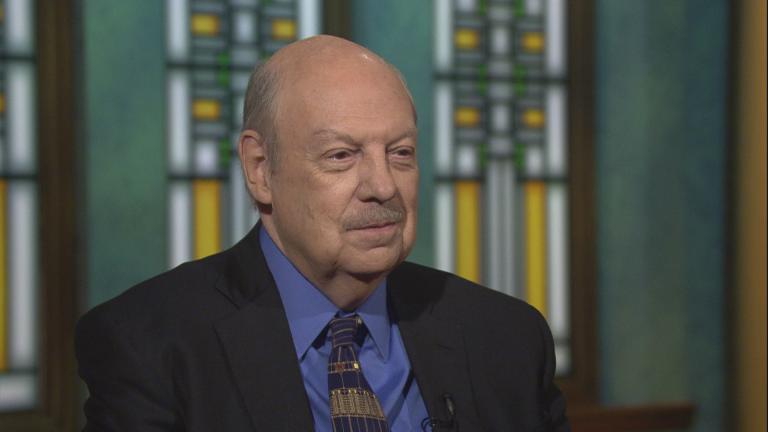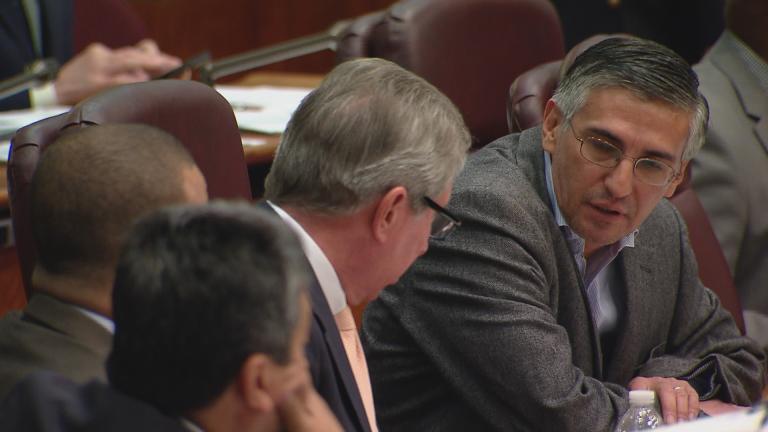From the Jan. 6 insurrection to misinformation and political tribalism, American democracy is facing significant challenges.
Chicago has not always had the most cordial relationship with democracy over decades of machine-style politics. A new book from a longtime Chicago political observer aims to diagnose what’s wrong and offer prescriptions to fix it.
The book, “Democracy's Rebirth: The View from Chicago,” was written by Dick Simpson, a former alderman and longtime political scientist at the University of Illinois Chicago.
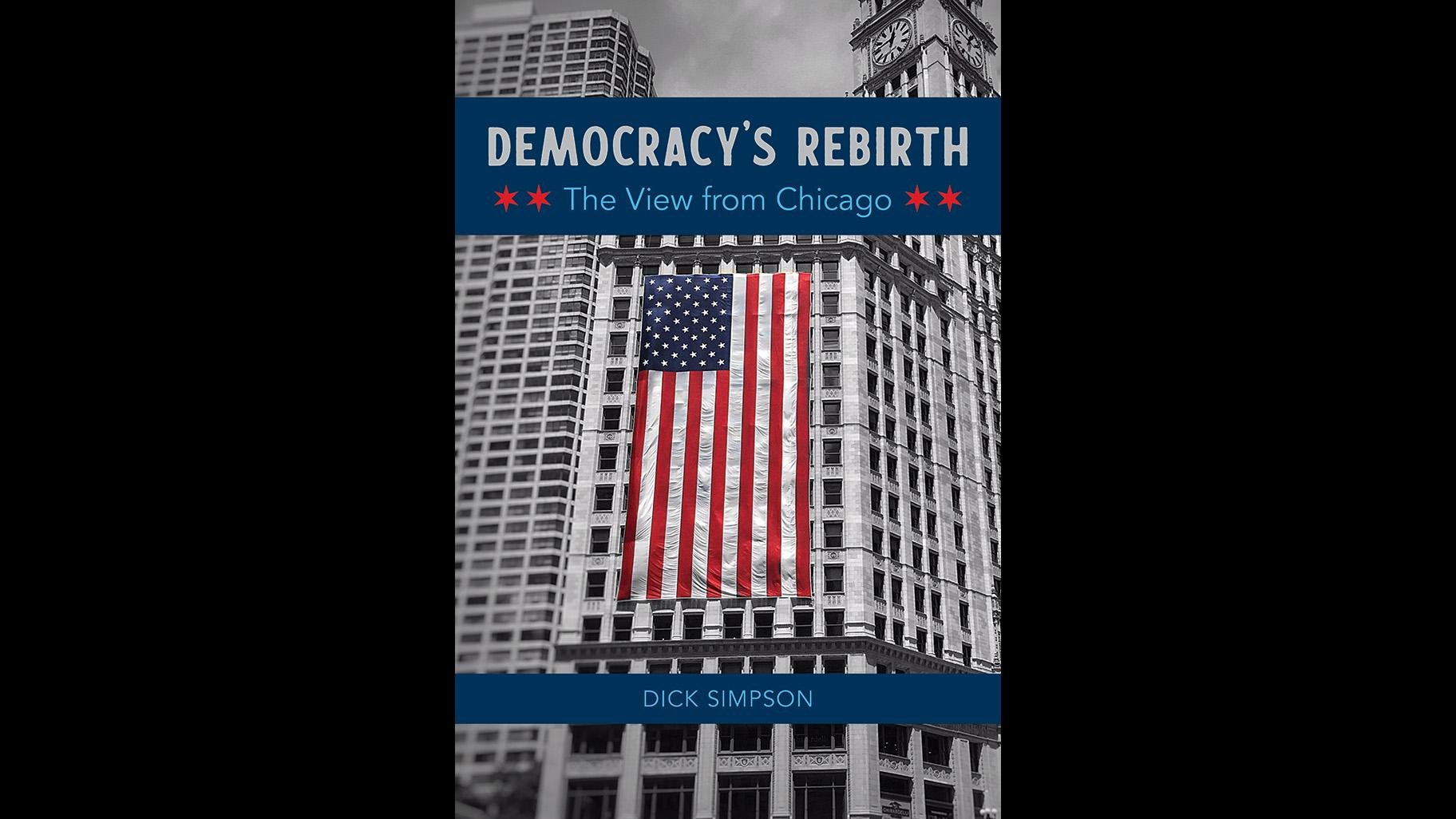 (University of Illinois Press)
(University of Illinois Press)
Lessons from the Past
Mark Twain reputedly said, “History doesn’t repeat itself, but it rhymes.” We are not doomed to repeat history exactly, but there are lessons we can learn from past experience.
The usual lesson drawn by students of history is that all civilizations begin small, grow, decline, and fall just as individuals do in their personal lives. Thus the frequent reference to the decline and fall of Rome with the inference that America is in decline and cannot be saved from Rome’s fate. It is true that all democracies fall, as all previous civilizations have. Someday that will be our fate. Yet, there is no particular reason to believe that after only 250 years the American democratic experiment must come to an end now. There is no reason that we can’t reinvent, refound, and reform our democracy for the twenty-first century. This is, after all, what happened with the Civil War as Lincoln proposed with his Gettysburg Address, which begins “four score and seven years ago” and ends with his call for a “new rebirth of liberty.” With the defeat of Donald Trump in 2020, we have the opportunity for America to again experience a new beginning. President Joe Biden has reversed many Trump policies, begun the defeat of the COVID-19 pandemic, and laid the groundwork for recovery from the economic recession that accompanied the pandemic. The question is whether we will seize the opportunity now to build on this beginning or continue the decline in our representative democracy’. “
In the United States, we have historically sought to revitalize our democracy as” voting rights have been won by more groups—poor Whites, African Americans, other minorities, women, and youths. We have expanded the electorate from the days in which only relatively affluent White males could vote and serve in government. At the local level in Chicago, there has been a continuous battle between machine politicians and reformers. In modern times, the city has been made more just and more democratic under progressive, reform mayors like Harold Washington and Lori Lightfoot. But the battle to reform Chicago is ongoing.
The complexities of our twenty-first-century world make it difficult for us to create at the national level “a more perfect union.” Today, the ever- widening gap between the rich and the poor, which approaches levels of the Gilded Age before the Great Depression, threatens our democracy. President Lincoln said that we cannot long exist half slave and half free. Today, we cannot long exist with a too-rich 1 percent, a too-poor 99 percent, and a disappearing middle class. Added to these challenges is institutional, structural racism, which has been the most common cause of the demonstrations and protests for more than the past six years. It continues to prevent equality for all. Thus, income and racial inequality inevitably set the stage for oligarchy in the form of the rule by a small wealthy class. Slavery in Lincoln’s America has given way to a permanent underclass today. Racial inequality is also apparent in our treatment of the twelve million undocumented immigrants in our land with no path to citizenship. America used to be a great melting pot where it was believed that everyone could make a good life through hard work and education, if not in this generation then in the next. If there is now a permanent upper class of inherited power and wealth and a permanent underclass and undocumented immigrants living in misery generation after generation, then the American Dream is destroyed. And our nation will fall.
In the American experiment with freedom and democratic government, we have prized the principles of representative democracy and created a constitution whose goal was to prevent tyranny and domination. To be sure, our practice has not always lived up to this promise. In Chicago, we have for 150 years been stuck in a form of Machine Democracy in which dominance by a single political party headed by political bosses and characterized by patronage, corruption, and stolen elections, belied and betrayed the American promise. We have the formal trappings of democracy in Chicago and the country, like elections and a separation of powers, but a collusion of businessmen and politicians have dominated government decision making.
A robust reform movement has continuously attempted to end the reign of machine politics in Chicago. Certainly, reforms have been made. As already noted, in 2019 Chicago voters elected a reform mayor and a more progressive city council. Both Mayor Lightfoot and many aldermen ran on explicit anticorruption, reform platforms. Since their election, they have enacted a series of new ethics ordinance and regulations to contain corruption and have passed laws to get the wealthy to pay their fair share of taxes, protect immigrants from deportation, and improve the conditions of minorities and the poor.
Chicago’s long struggle with machine politics remains emblematic of the nation’s struggle. The ideal of liberty, freedom, prosperity for all, and democratic rule has eluded us even as it continues to provide inspiration. Nationally, we continue to struggle with even formal representation.
In the very close and highly contested election of 2020, President Trump argued that the election and its results were fraudulent. Many of his supporters and prominent Republican Party officials agreed. While the empirical evidence in fifty court cases since have upheld its basic fairness of the 2020 election and certified the results, some Americans remain unconvinced even today. Our nation is still divided.
American politics has outgrown Chicago machine politics in a number of ways. However, the problems of income and racial inequality, money in politics, low citizen participation, domination by elites, structural flaws, and political polarization remain. Much remains to be done to overcome these challenges.
The tumult in our national politics points to the urgency of democracy’s rebirth. We are still more an oligarchy than a democracy. Added to this, we chose for a time a leader, who despite his promises, did not “Make America Great Again.” Although the nation has survived his presidency, as we survived mediocre presidents in the past, his election and administration are proof that more reforms are needed. In truth, our fundamental problems did not begin with Donald Trump, nor did they end with his defeat in 2020. But the democracy that was undermined during his presidency must now be repaired.
We begin with the bedrock principle that, in order for us to claim to be a democracy, our elections must be free, fair, and frequent. We must modify our election processes to allow mail-in ballots, early voting sites, automatic voter registration, and eventually, electronic voting to increase participation. During the COVID-19 pandemic, more Americans voted by mail-in ballots and at early voting sites than at any time in our history. The number of votes cast in the 2020 election was the largest in U.S. history. With 67 percent of the voting-eligible population participating, it had the greatest percentage of the electorate participating since the election of 1900. So, these changes in the methods by which Americans vote need to last past the pandemic despite renewed efforts at voter suppression for partisan advantage in many states.
We must ensure that we provide the opportunity for those who wish to gain citizenship and to be registered to vote. And we must guarantee that everyone has their vote counted equally. This is what allows each of us to have a voice in determining our representatives and the policies governing us. In the future we must also protect against continuing cyberattacks on our democracy.
In Chicago, as we continue to confront the legacy of machine politics with more convictions of public corruption by government officials. However, the machine is not yet, “dead, dead, dead,” as Mayor Harold Washington so hopefully proclaimed nearly thirty years ago.
Thus, we have work to do at both the local and national level to protect our elections, extend citizen participation, and to remake our government. There is no doubt that our democracy has been damaged. Repair and renewal are required.
Do we have the political will to undertake the major reforms needed for democracy’s rebirth? Let us seize this opportunity to overcome our challenges. Let us bring a new dawn in American government.
Excerpted from “Democracy’s Rebirth: The View from Chicago” by Dick Simpson. Copyright 2022 by Dick W. Simpson. Used with permission of the University of Illinois Press.

